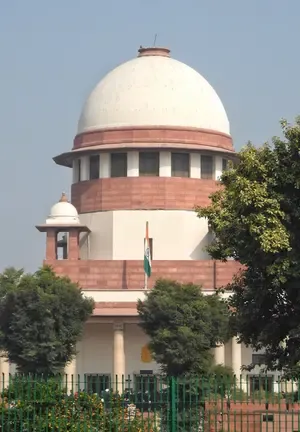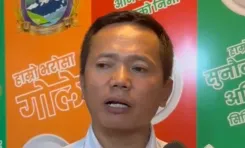Is the Tamil Nadu Bills Case Leading to a Supreme Court Showdown Over Presidential Authority?

Synopsis
Key Takeaways
- The Supreme Court has formed a 5-judge Bench for the Tamil Nadu Bills case.
- President Murmu's reference raises important constitutional questions.
- The ruling may impose deadlines for legislative assent.
- Judicial review could apply to Presidential actions regarding Bills.
- Governor's discretionary powers are under scrutiny.
New Delhi, July 19 (NationPress) The Supreme Court has established a specialized 5-judge Bench to examine the reference submitted by the President under Article 143 of the Constitution following the apex court's ruling in the Tamil Nadu Bills case.
According to the cause list available on the apex court's website, the Bench, led by Chief Justice of India (CJI) BR Gavai, along with Justices Surya Kant, Vikram Nath, PS Narasimha, and Atul S Chandurkar, will take up the reference titled “In Re: Assent, Withholding or Reservation of Bills by the Governor and the President of India” for hearing on July 22.
In May this year, President Droupadi Murmu referred to the top court, querying whether timelines can be enforced on Governors for acting on Bills where no constitutionally-mandated time limit exists. Additionally, the President sought the apex court's opinion on the constitutional options available to a Governor when a Bill is presented to them under Article 200 of the Constitution of India.
“Is the Governor obligated to follow the counsel and advice provided by the Council of Ministers while exercising all available options when a Bill is presented to them under Article 200 of the Constitution of India?” the President inquired. The question also addressed whether the exercise of constitutional discretion by the Governor regarding Bills is subject to judicial review, given that Article 361 of the Constitution imposes a strict prohibition on judicial review of gubernatorial actions.
“In the absence of a constitutionally-mandated timeline and the manner of exercising powers by the President, is it feasible to impose timelines and prescribe the manner of exercise through judicial orders for the President's discretion under Article 201 of the Constitution of India?” President Murmu asked the top court to contemplate and report its perspective.
In April 2025, a two-judge Bench of the Supreme Court utilized its inherent powers under Article 142 of the Constitution to mediate a standoff between the Tamil Nadu government and Governor R.N. Ravi regarding the delay in granting assent to Bills passed by the Assembly. The court determined that Governor Ravi's refusal to approve 10 Bills in Tamil Nadu was both “illegal and arbitrary,” imposing a three-month deadline for Presidential and gubernatorial approval of Bills that the legislature has passed again.
“The President is mandated to make a decision on the Bills reserved for their review by the Governor within three months from the date such reference is received,” stated the Bench of Justices J.B. Pardiwala and R. Mahadevan. If no decision is rendered within this timeframe, states are entitled to file writ petitions seeking a writ of mandamus against the President, the Justice Pardiwala-led Bench clarified.
The apex court exercised its powers to declare the 10 Bills that were withheld as having been assented to on the date they were presented to the Governor after being reconsidered by the state legislature. The court maintained that once a Bill is returned, re-passed by the legislature, and presented again to the Governor, it is not within the Governor's discretion to reserve it for the President’s review.
Furthermore, the President is now required to provide justifications for their decisions, which must be communicated to the state government. It was also suggested that the President should consult the Supreme Court regarding Bills that involve constitutional matters.
This judgment notably subjected Presidential actions to judicial review by instituting a three-month deadline for granting assent to Bills. The situation took an intriguing turn after Vice President Jagdeep Dhankhar expressed strong opinions against the judiciary, likening Article 142 to a ‘nuclear missile’ at the judiciary's disposal against democratic forces.






